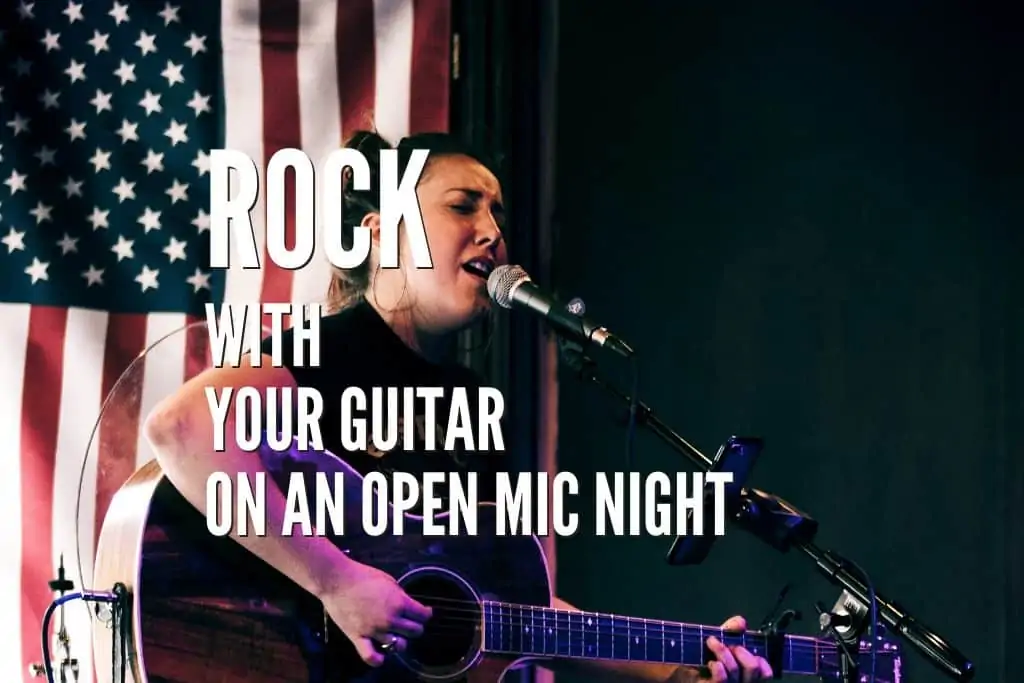Playing at an open-mic session is a wonderful experience. You will learn a lot about jamming with other musician’s music. If you have not been to an open mic before you are getting used to the experience, this guide will help you.
Use the techniques in this guide to make your experience on stage an awesome one. Have fun at an open mic session and enjoy yourself as you share your music with others.
Put A Fresh Set Of Strings
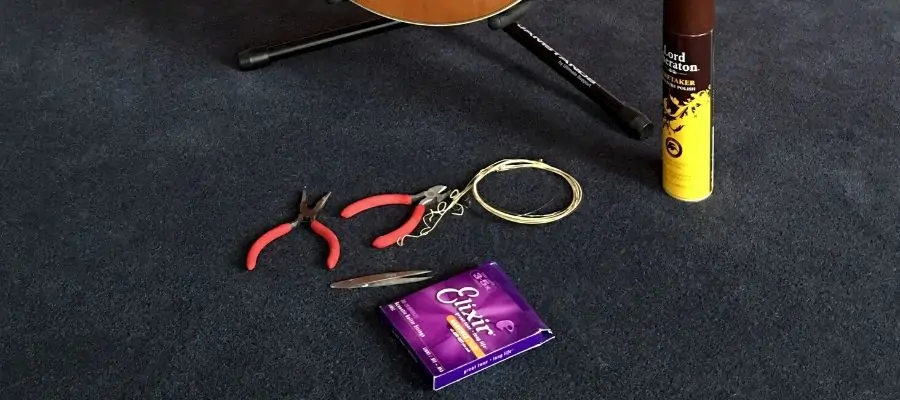
It is always a good idea to put on fresh strings before you go on stage. But make sure you do it a few days before that and played them for several hours at least.
This is due to the fact that when you put a set of new strings you will have to re-tune your guitar several times. I’m sure you don’t want it to happen on the stage.
Most players should change guitar strings every three months, so if you changed yours a month before then you should be fine.
I personally use and recommend Elixir strings and you can check them out at my recommendations post Top 27 Must Have Guitar Accessories For Every Guitarist
Tune Your Guitar
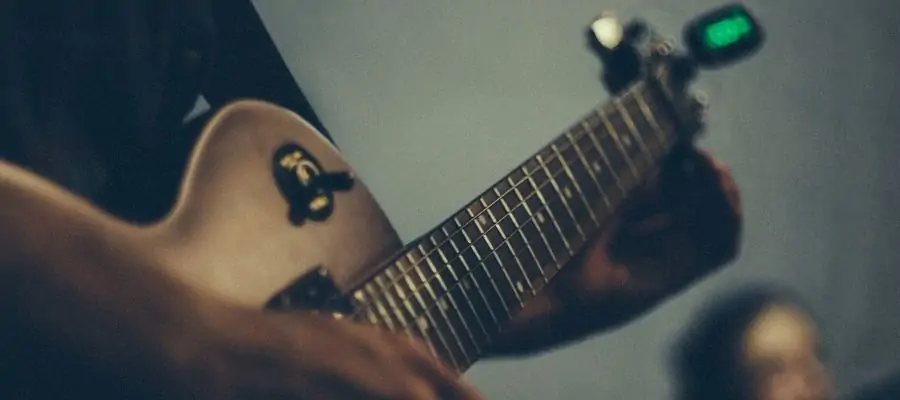
The first thing you need to do before you go on stage is to ensure that your guitar is in tune. There’s nothing worse than getting set to play a song and finding that your guitars are not in tune. Tuning your instruments shows that you’re a professional and ready to go.
Make note of any songs that are going to be in any altered turnings. Set up your guitar for these songs before hitting the stage. Alternate to that guitar when it comes time to play that song.
Recommended guitar tuners include pedal board tuners, smartphone app tuners, and headstock tuners. These tuners make it easy to get up to pitch fast without hassles.
If you still don’t have a tuner, you can check out my recommendation at Top 27 Must Have Guitar Accessories For Every Guitarist
Be Positive

A positive mindset is essential if you want to play on stage. You want to be in the right frame of mind before performing. You need to tell yourself that it’s going to be an excellent show.
You will be awesome on stage when you have a positive frame of mind. Don’t dwell on negative emotions because these won’t help you play your best.
You have taken a large step going on stage to play. Be positive about the experience and enjoy the process. Ask yourself why you want to play on stage.
It might be a goal that you have had for a long time. The experience should be an exciting one so have a positive mindset and make the most of the experience.
Get to Know the Venue
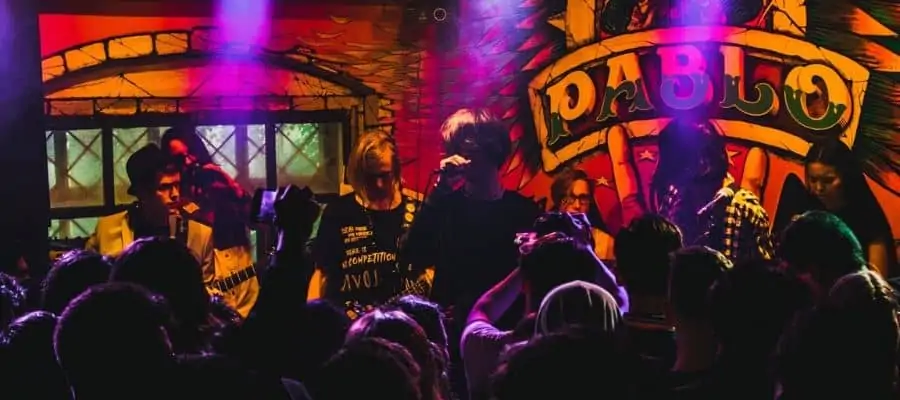
Before you go on stage in a live setting you want to get to know the venue. You want to know what the venue wants from their performers. Some venues may give you free drinks to play on the stage while others may not.
You should understand the types of music that the venue is going to play and play within that framework. If you’re in a country bar, for example, they’re not going to want hard rock music.
You want to play at a venue that is going to suit your musical style. Some venues may play many types of music or have a strict guideline. Know what to expect before going on stage and understand the rules.
Bring Only What You Need
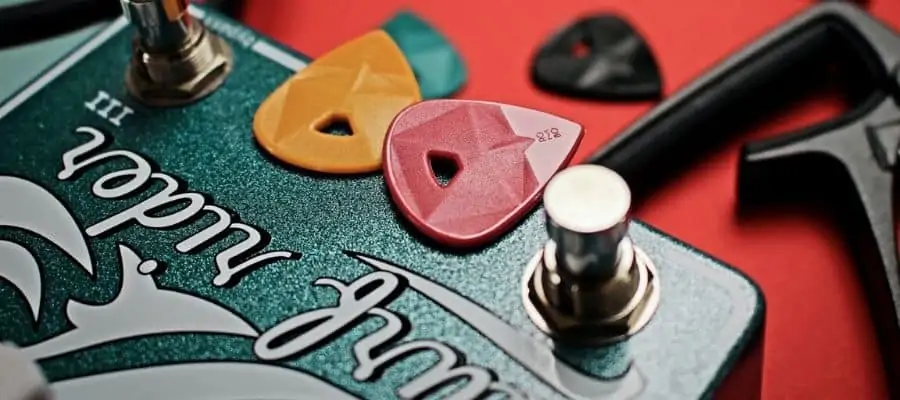
Most stages are quite small. You want to only bring the instruments that you need to perform. You should only bring one or two guitars. This will free up room on the stage for the other instruments.
You may be able to borrow an instrument from another player in some cases. Bring your accessories such as pics, strings guitar cable, and other materials. You don’t want to fumble around for them before getting on stage. Here are the recommended materials:
- Several guitar picks
- Change of stings
- Peg winder and wire cutters
- Tools for guitars adjustments
- Extra cable
- Batteries or adapters for pedals
- Slide
- Capo
If you are missing something from this list, then check out my list Top 27 Must Have Guitar Accessories For Every Guitarist
Master Your Material
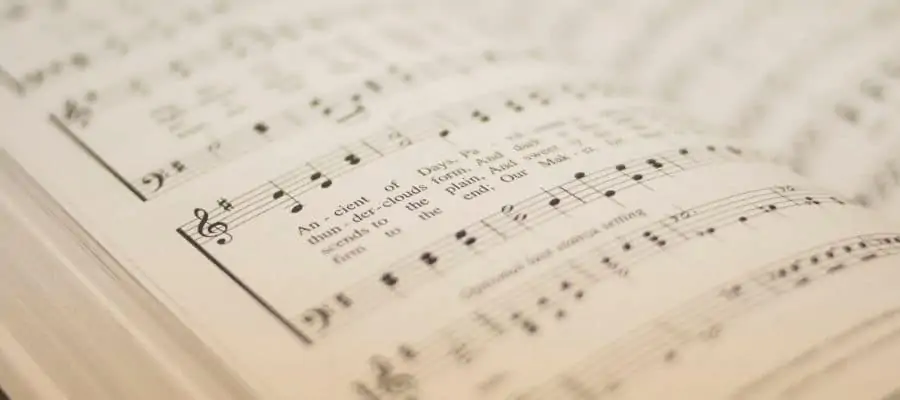
Before you play live you need to master your materials. You want to be able to play the song backward and forwards without making any mistakes. In some cases, patrons are going to have paid a lot of money to get into the venue.
You want to ensure they have the best time possible. Know what you’re doing on stage and prepare beforehand. Pick songs that will be easy for you to master until you’re used to playing on stage. Take a couple of weeks and design yourself a setlist.
Know the songs are going to play backward and forwards.have a couple of songs that you can use as an alternative. Visit the venue a few times to get a feel for the songs that are the most popular.
If you can play any of these songs, those would be perfect for your set. This is ideal because the other musicians already know them. Once you have a good feel for the process you can play something a little more complex.
Be Relaxed

Play on stage for the first time will be a nerve-wracking experience. Do your best and be as relaxed as possible. Don’t think too much about what you’re doing. Go on stage and perform without second-guessing yourself. You will feel a little bit nervous but this is normal. Don’t allow your nervousness to get the best of you.
Take a few deep breaths before you go on stage, get in the right frame of mind, and do it. Relax and have fun playing. As you play more open mic sessions you’ll get used to the process and be more relaxed.
Play Sober
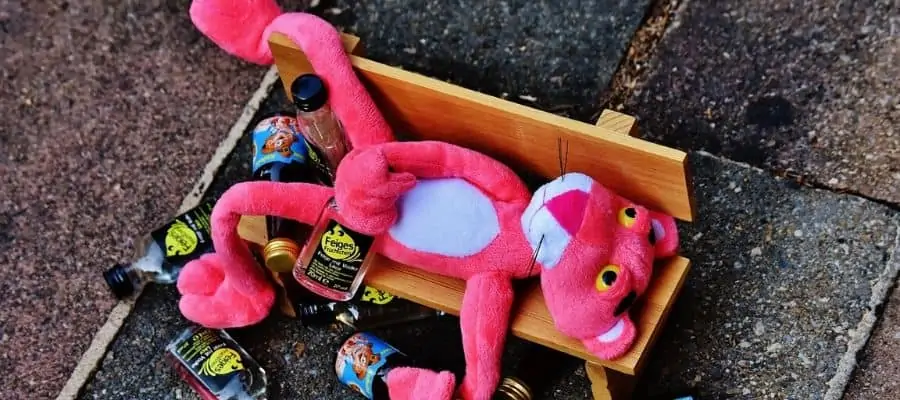
You want to play sober when you’re on stage. You will make mistakes if you were drinking or on drugs. You won’t make a very good first impression if you can’t play your material on the stage. While you can have a couple of drinks after your set, don’t go on stage if you have been drinking.
Once you have played the venue of a few times then it is acceptable to have a beer or two when you are on the stage. Don’t do this at first because you might be quite nervous and you could end up drinking more than you should.
Have A Friendly Attitude
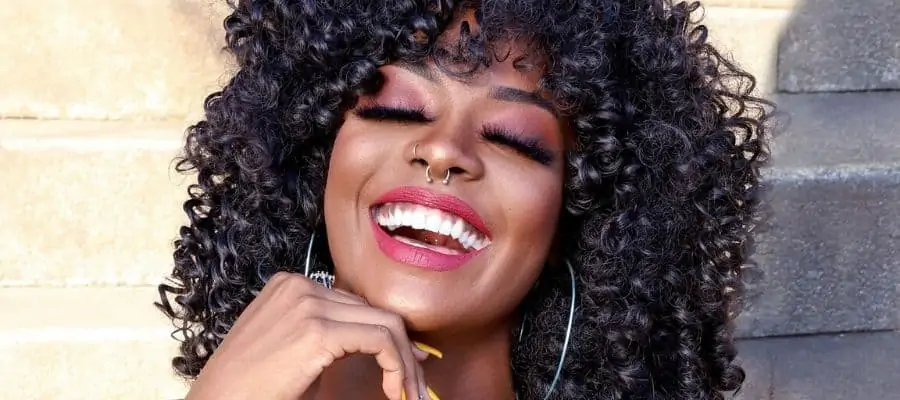
Be friendly to the attitude when you perform and thank the guests for coming to the show. Thank them at the end of the show for listening. Tell the audience to come back and visit the venue again. You should also be friendly to the other band members and introduce yourself.
No one wants to be around someone that is in a bad mood all the time. A poor attitude or a know-it-all attitude won’t get you very far with other musicians. Be friendly to everyone and have a good time while you are performing.
Look At The Audience
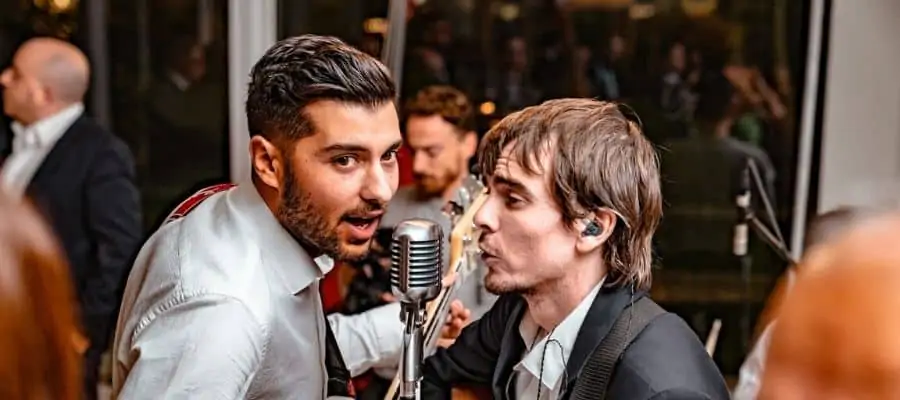
You want to make a connection with the audience so look at them while you are playing. If you are going to be singing along with playing your guitar, this is critical.
The audience wants to know that you’re trying to make a connection with them. Look at the audience and show them that you have confidence on the stage.
If you’re shy or nervous pretended that they are not there. Lookout and see empty seats, not the people sitting in them. Remember that people will be jealous that you are on stage since they don’t have the talent you do to play guitar.
Play Short Songs
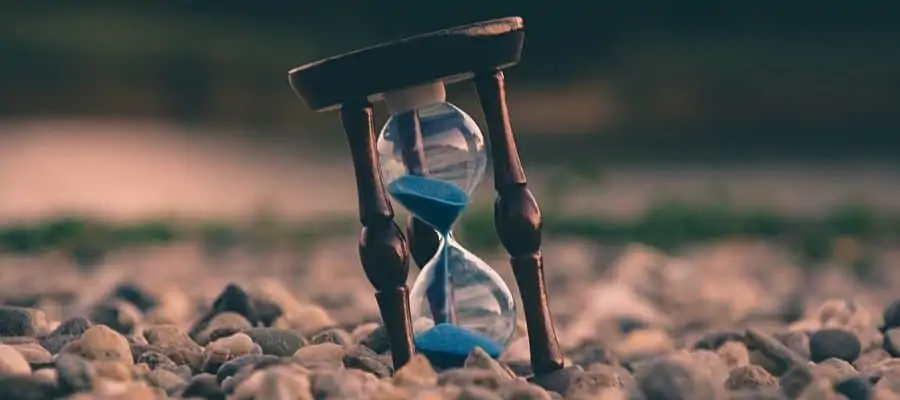
You might want to play long songs but this can be boring for the audience. People at a venue or bar have a short attention span. You want to play short songs that get them up dancing on the floor.
There may also be other people that want to perform so play some short songs so they get a chance to play too. Aim for songs in the 3 to 5-minute range. Don’t go over this unless the song is quite popular and recognized.
Play Popular Songs
You may like obscure music, but most people at a club or bar might not. Play songs that are popular so everyone will recognize them. People go to venues to have a good time and they will enjoy themselves if they recognize the music.
Don’t play songs that leave people scratching their heads about what you’re playing. There are lists on the internet of popular songs. You should try to learn as much of them as possible before performing.
Play Songs With Different Tempos
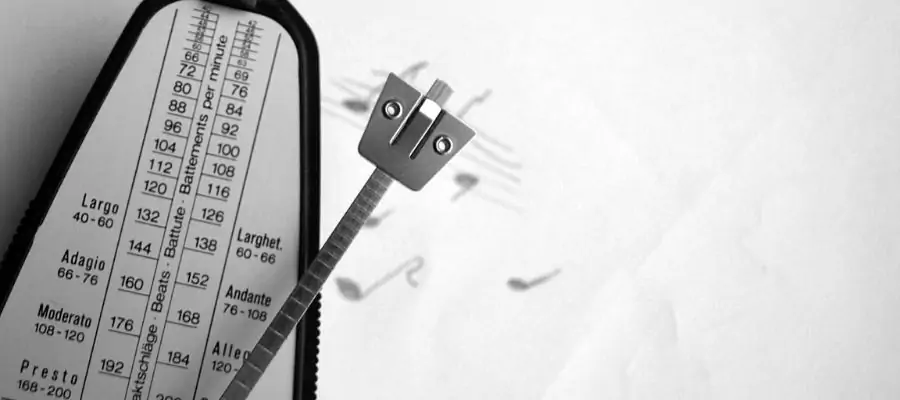
People enjoy dancing to different beats. You don’t want to play songs that are all fast or all slow. Try to change up the music that you’re playing. this will create excitement on the dance floor.
For example, you can start off with an upbeat song then switch to a slower song. You could finish your set with a faster song. Make sure you keep the audience interested in different tempos.
Play Your Part
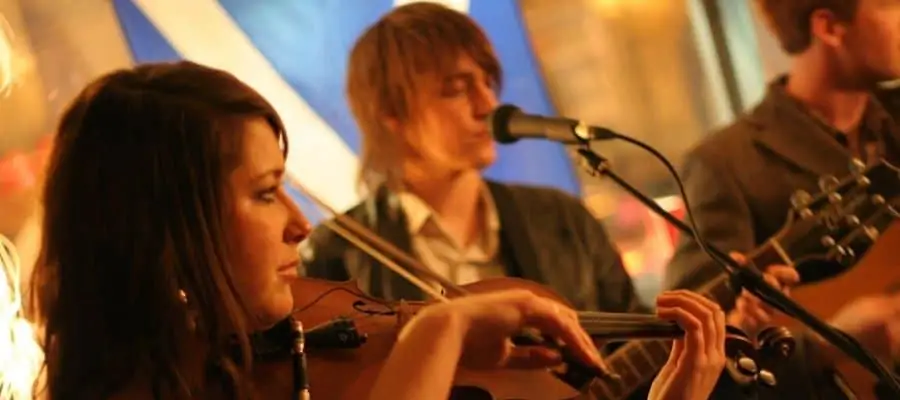
When you’re on stage performing you will probably be assigned a part. For example, you may be assigned the rhythm part or you may be assigned a solo. You should let the other musicians know what you are capable of.
You may be more of a rhythm player so you will be playing these parts. Follow the general directions of the band so you know what to do. If they don’t know the song make sure you give them the chord progression so they can follow along.
Add Your Own Spin On A Song
Add excitement and more entertainment for the audience by changing the song a little bit. Most bands will play songs that are exactly the same as the record. You can add a little bit of variety by changing the song up a little bit. You can do this by adding in a different solo or it’s sending the song by a shorter duration.
If you are singing you may try singing the song in a different way such as a different key. listen to other performers are cover songs of popular music to get an idea of how you can add your own spin to music.
Listen To The Other Musicians
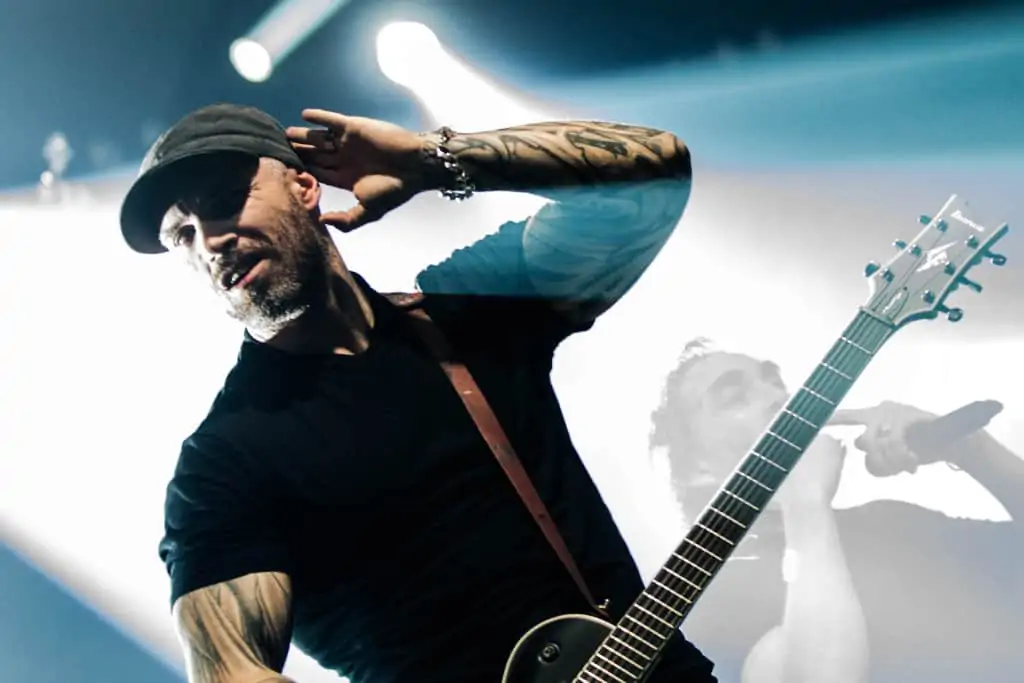
Your listening skills on stage are critical. You want to listen to all the other musicians. Follow along with what they are doing.
When there’s going to be a change in the music you can nod to them. This can be a sign that it’s time for someone to solo. The band members may look at you when it’s time for you to solo.
Stay on top of what everyone is doing and keep the beat. It’s easy to get sidetracked to keep your ear open for the chord changes. You want to work together on the stage so that the songs sound great. It’s a group effort on stage so you went to all be on the same page when you are playing.
Don’t Show Off
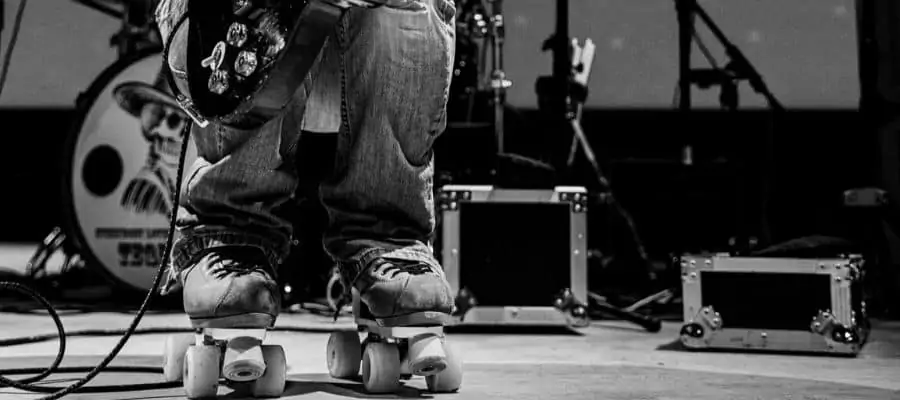
You may be the hottest guitar player on the planet. If you happen to have exceptional skills, don’t use this as an excuse to show off on stage. You are there to jam with other musicians.
They may be better than you or not quite as good as you. The show is not a competition or a way to show off your “mad” guitar skills. The show is for the audience and not you. Always put the audience first and pay what is appropriate.
Showing off on stage leaves a bad impression with the other musicians. You can still put on an excellent show. Don’t think you own the show because you’re jamming and might be a good guitar player.
Play your part and nothing more unless the band asks you to extend the solo or add more to the song. The music should still rock but you rock together with the band.
Compliment The Other Musicians
You should make it a habit of complimenting the other musicians. Tell them that their solo was great or that you enjoyed their rhythm part. You want to make friends while you are on stage so compliment the other players. If you do this, compliments will come your way as well. everyone is there to have a good time.
Give the other musicians compliments. This will help everyone perform better because you’re installing confidence in each other. Your whole goal is to put on an amazing show. do your best, complement each other, and enjoy the experience.
Socialize With The Other Musicians
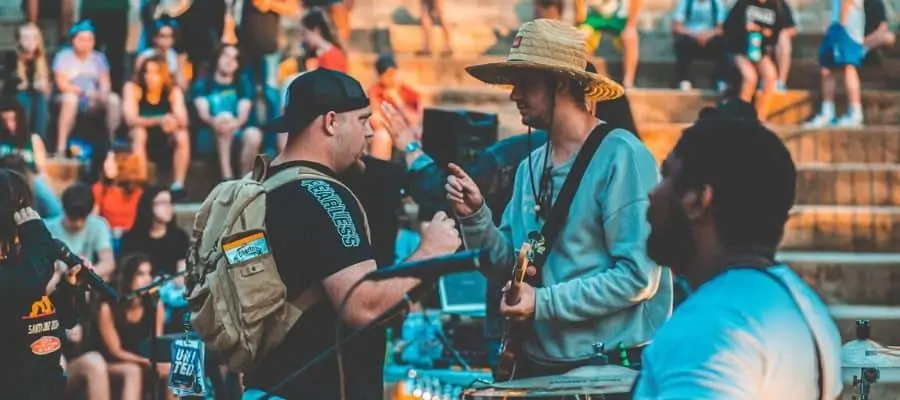
Try to socialize with the other musicians. After the show, you might have a drink with them. They want to get to know you as a player.
You can exchange ideas, email, phone numbers, and so on If this is what they want to do. Make friends and be an approachable player that others will enjoy playing with.
Ask when the next open mic is. That didn’t know that you’re going to show up again and want to play more music. You want to be a guitar player that is accessible to other musicians. Don’t play your part and then walk away, as this doesn’t look good on you.
Stay after the show and get to know the others that are playing at that venue.
Don’t Stress Over Mistakes
When you play on stage you will make mistakes. You don’t want to be a perfectionist because you can’t be.
If you go to live music you will always hear mistakes so expect to make them at an open mic session. If you make a mistake, get back into the music as soon as you can.
When you were first doing open mics you may make quite a few mistakes due to your nervousness. Don’t stress over the mistakes you make learn from them. You will do better the next time out.
Take the mistakes you make and analyze why you made them. In some cases, it’s going to be down to your nerves. Ask the other musicians how they deal with mistakes and use their tips for the next time around. Proper preparation is another way to cut down on the number of mistakes that you make.
Help Pack Up After The Show
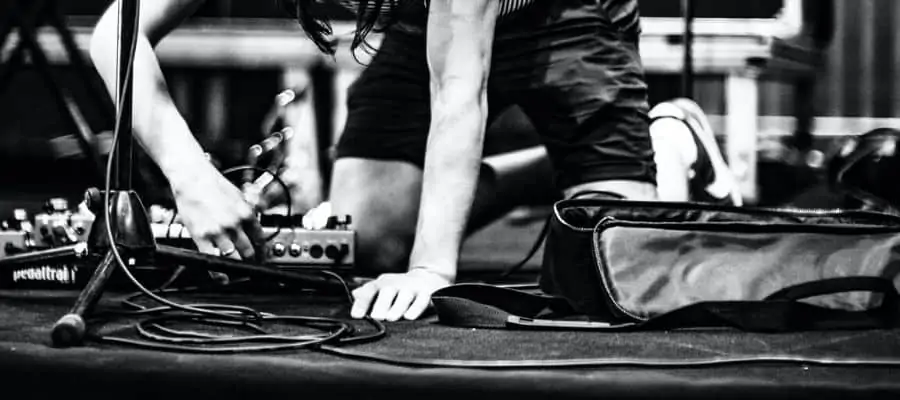
Stay until the open mic is over. Ask if there is anything you can do. They may or may not need your help but ask. There is a lot of equipment to move. This equipment is heavy and it takes time to move it.
Offer your help to move everything. The other musicians will appreciate this gesture from you. Work together to clear the stage. Make sure you ask directions about how to proceed with packing up the stage before you begin.
You want to show them that you are friendly and that you care about the show. This could even help you make connections with other players. You could open up new musical connections this way.
Another band may ask you to join them at another gig. Help out after the gig and show that you’re as an awesome person to be around.
Conclusion
Playing at an open mic is a big step in your musical career. It’s one of the best ways to become a better guitar player so get yourself on stage as soon as you can.
Take the tips in this guide and apply them to your own open mic session. Getting on stage takes some willpower but it’s well worth it. Have fun enjoy yourself during your open mic.
If you found this article useful, you may want to save this pin below to your Guitar board.
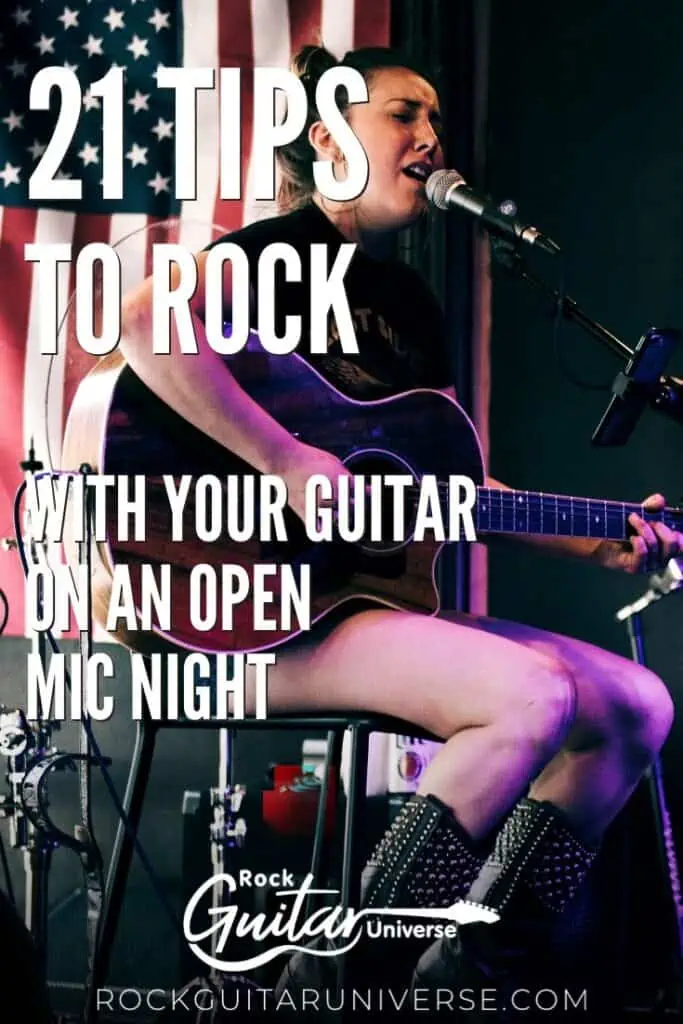
Recent Posts
Some guitarists insist on buying an expensive amplifier with their electric guitar. They assume that this is a must for every type of guitarist out there. However, in some situations, this isn’t...
Top 50 Free Realistic Guitar VST Plugins With Sound Examples
As technology has rapidly advanced in the recent decade, computers are stealing more and more roles from physical musical instruments and accessories. Nowadays, you do not need expensive amps,...

